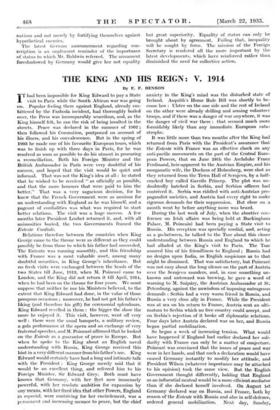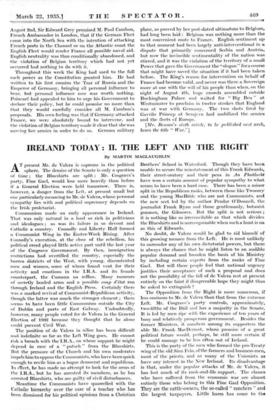THE KING AND HIS REIGN : V. 1914
By E. F. BENSON
IT had been impossible for King Edward to pay a State visit to Paris while the South African war was going on. Popular feeling there against England, already em- bittered by the Fashoda incident, had thoroughly boiled over, the Press was incomparably scurrilous, and, as the King himself felt, he ran the risk of being insulted in the streets. Peace was declared in the summer of 1902 ; then followed his Coronation, postponed on account of his illness, and his convalescence. But in the spring of 1903 he made one of his favourite European tours, which was to finish up with three days in Paris, for he was resolved as soon as possible to do his utmost in procuring a reconciliation. Both his Foreign Minister and the British Ambassador in Paris were very doubtful of his success, and hoped that the visit would be quiet and informal. That was not the King's idea at all : he stated that he wished to be received " as officially as possible, and that the more honours that were paid to him the better." That was a very sagacious decision, for he knew that the French Government were as anxious for an understanding with England as he was himself, and a pageant of cordialities was what was required to start better relations. The visit was a huge success. A few months later President Loubet returned it, and, with all animosities buried, the two Governments framed the Entente Cordiale.
Relations therefore between the countries when King George came to the throne were as different as they could possibly be from those to which his father had succeeded. The Entente was running smoothly, and this friendship with France was a most valuable asset, among many doubtful securities, in King George's inheritance. But no fresh visits were exchanged between the heads of the two States till June, 1913, when M. Poincare came to London, and the King did not return it till April, 1914, when he had been on the throne for four years. We must suppose that neither he nor his Ministers believed, to the extent that King Edward had done, in the value of those pompous occasions ; moreover, he had not got his father's liking (and therefore his gift) for ceremonial splendours. King Edward revelled in them : the bigger the show the more he enjoyed it. This visit, however, went off very well : there were the usual banquets, a military review, a gala performance at the opera and an exchange of very fraternal speeches, and M. Poincare affirmed that he looked on the Entente as a guarantee of peace in Europe. But when he spoke to the King about an English naval understanding with Russia, King George received this hint in a very different manner from his father's use. King Edward would certainly have had a long and intimate talk with the President : King George merely said that it would be an excellent thing, and referred him to his Foreign Minister, Sir Edward Grey. Both must have known that Germany, with her fleet now immensely powerful, with her resolute ambition for expansion by any means, with her fixed idea that other Powers, England in especial, were contriving for her encirclement, was a permanent and increasing menace to peace, but the chief anxiety in the King's mind was the disturbed state of Ireland. Asquith's Home Rule Bill was shortly to be- come law : Ulster on the one side and the rest of Ireland on the other were already drilling and arming volunteer troops, and if there was a danger of war anywhere, it was the danger of civil war there : that seemed much more formidably likely than any immediate European cata- strophe.
It was little more than two months after the King had returned from Paris with the President's assurance that the Entente with France was an effective check on any anti-pacific movements on the part of the Central Euro- pean Powers, that on June 28th the Archduke Franz Ferdinand, heir-apparent to the Austrian Empire, and his morganatic wife, the Duchess of Hohenberg, were shot as they returned from the Town Hall of Serajevo, by a half- cracked boy called Gavrilo Princep. The plot was un- doubtedly hatched in Serbia, and Serbian officers had contrived it. Serbia was riddled with anti-Austrian pro- pagandist societies, and Austria had every right to make rigorous demands for their suppression. But close on a month went by before anything more was heard.
During the last week of July, when the abortive' con- ference on Irish affairs was being held at Buckingham Palace, M. Poincaire had been paying a State visit to Russia. His reception was specially cordial, and, acting as a go-between, he talked to the Tsar about this closer understanding between Russia and England to which he had alluded at the King's visit to Paris. The Tsar assured him of his friendliness to England ; Russia had no designs upon India, so English suspicions as to that might be dismissed. That was satisfactory, but Poincare was not easy about the long silence on the part of Austria over the Serajevo murders, and, in ease something un- known and untoward was brewing, he gave a word of warning to M. Sztipary, the Austrian Ambassador at St. Petersburg, against the unwisdom of imposing outrageous demands : Serbia had a very warm friend in Russia, and Russia a very close ally in France. While the President was at sea on his return to France, Austria sent an ulti- matum to Serbia which no free country could accept, and on Serbia's rejection of it broke off diplomatic relations. Four days later Austria declared war on her, and Russia began partial mobilization.
So began a week of increasing tension. What would have happened if England had earlier declared her soli- darity with France can only be a matter of conjecture. Poincare was convinced that the issues of peace and war were in her hands, and that such a declaration would have caused Germany instantly to modify her attitude, and President Wilson (whatever importance may be attached to his opinion) took the same view. But the English Government thought differently, holding that England as an influential neutral would be a more efficient mediator than if she declared herself involved. On August ist Germany declared war on Russia, and France, both by reason of the Entente with Russia and also in self-defence, ordered general mobilization. Next day, Sunday, August 2nd, Sir Edward Grey promised M. Paul Cambon, French Ambassador in London, that if the German Fleet came into the North Sea with the intention of attacking French ports in the Channel or on the Atlantic coast the English Fleet would render France all possible naval aid. English neutrality was thus conditionally abandoned, and the violation of Belgian territory which had not yet occurred had nothing to do with it.
Throughout this week the King had used to the full such power as the Constitution granted him. He had written to his first cousins the Tsar of Russia and the Emperor of Germany, bringing all personal influence to bear, but personal influence now was worth nothing. Poincare had appealed to him to urge his Government to declare their policy, but he could promise no more than that they would carefully consider all M. Cambon's proposals. His own feeling was that if Germany attacked France, we were absolutely bound to intervene, and the violation of Belgian territory made it clear that she was moving her armies in order to do so. German military plans, as proved by her post-dated ultimatum to Belgium, had, long been laid : Belgium was nothing more than the most convenient route to France. English sentiment qp to that moment had been largely anti-interventional in a dispute that primarily concerned . Serbia and Austria, but now the invincible sentimentality of the nation was stirred, and it was the violation of the territory of a small Power that gave the Government the "slogan" fora course that might have saved the situation if it had been taken before. The King's reason for intervention on behalf of France had become valid, and never was there a Sovereign more at one with the will of his people than when, on the night of August 4th, huge crowds assembled outside Buckingham Palace and waited for " Big Ben " at Westminster to proclaim in twelve strokes that England was at war with Germany. The two shots fired by Gavrilo Princep at Serajevo had mobilized the armies and the fleets cf Europe.
[Mr. Benson's sixth article, to be published next week, bears the title " War."1





























































 Previous page
Previous page